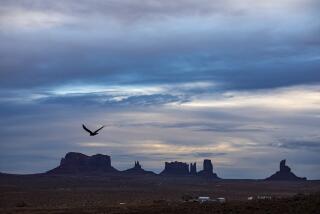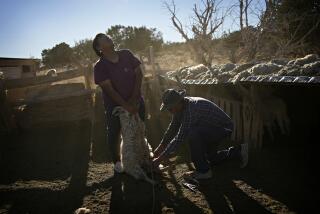A Woman Who Traded the Midwest for Grand Adventure With the Navajo
Sometimes when I travel, I discover not just places I love but lives I wish I had lived, like that of Dorothy Smith Hubbell.
In 1920, at the age of 21, she took the train from Connersville, Ind., to the Navajo Reservation in Arizona to teach school at a trading post. Her grandson, Ron Hubbell of Reseda, says she wrote a job acceptance letter to John Lorenzo Hubbell, who founded the post in the hamlet of Ganado around 1878, but then equivocated, sending four more letters, each reflecting a change of heart. No, yes, no, yes, she wrote.
When she arrived in Gallup, N.M., a four-hour wagon ride southeast of Ganado, J.L. Hubbell’s dashing younger son, Roman, was there to meet her. As it turns out, only the acceptance letter had arrived.
It’s small wonder that Dorothy, who was single, had second and third thoughts about moving to such an isolated spot. Even now, Ganado, a Navajo settlement on a creek called Pueblo Colorado Wash, seems in the middle of nowhere, as I discovered when I went there in the fall. It is near the southeast corner of the sparsely populated 25,000-square-mile reservation, on the rugged Colorado Plateau, where there’s little more vegetation than dwarf juniper and pinyon pine to soothe the eye.
But Dorothy settled right in and married Roman, a romantic character who worked at a score of jobs in his lifetime, including tour guide, rancher and trader. As soon as he saw the handsome, dark-haired Dorothy, he was a “goner,” his father is reported to have said. As time went by, Dorothy raised his two sons from a previous marriage, taught various Hubbell children to read and write, worked in the post, got to know the Navajos who frequented it and came to think of Ganado as home.
When Roman died in 1957, she continued at the post alone, then helped secure its place in history by selling it a decade later to the National Park Service for $350,000.
So it is thanks to Dorothy that the place has survived as the Hubbell Trading Post National Historic Site. There I saw Navajo weavers ply their craft in the visitors center, watched a crowd of kids buy soda in the post and took a tour of the adjacent low-slung adobe brick house where the Hubbell family lived and amassed a collection of Southwestern art valued today at $3.5 million.
In the large central living room, massive ponderosa pine beams straddle the ceiling, with antique Native American baskets hung between them. Eye-catching Navajo rugs decorate the floor and furniture, and the walls are chockablock with pictures, including sketches of Navajos by artist E.A. Burbank in delicate red crayon.
A portrait of family patriarch John Lorenzo Hubbell holds a place of honor. He appears to have resembled Theodore Roosevelt, who visited the post in 1913 to hunt and attend a Hopi snake ceremony.
John Lorenzo Hubbell, Dorothy’s father-in-law, was a man to be reckoned with. His life was the stuff of a John Ford western. He was born in New Mexico in 1853 and roamed widely as a youth. He worked briefly in southern Utah, where he was shot. (Accounts are not clear about who shot him.) A band of Paiute Indians found him wandering in the wilderness and nursed him back to health. He said he repaid the debt repeatedly to all Indians, according to “Indian Trader: The Life and Times of J.L. Hubbell,” by Martha Blue (Kiva Publishing, 2000).
The family business controlled more than 30 trading posts by the time he died in 1930. They were known as places where Native Americans received fair treatment. Hubbell was a state senator, brought a school and irrigation to Ganado, encouraged the weaving art and helped accustom the Navajo to the dictates of the federal government, such as grazing restrictions.
His biographers seem to agree that he treated his Navajo customers with a paternalism common at the time. Still, Hubbell said, “The first duty of an Indian trader, in my belief, is to look after the material welfare of his neighbors; to advise them to produce that which their natural inclinations and talent best adapts them; to treat them honestly and insist on getting the same treatment from them.”
Dorothy, nicknamed “Lady” by the family, appreciated the way he quoted Keats and Shakespeare in casual conversation and cheered her by saying things like “Daughter-in-law, the day’s brighter since you came in the room.”
After his sons Lorenzo and Roman died, none of his surviving blood relatives wanted to take over the business, which started suffering during the Great Depression and was further weakened by the introduction of cars and paved roads, allowing his customers to shop in big stores off the reservation instead of at the post.
Somehow it seems fitting to me that Lady saw it through its slow demise, handling affairs after the company went bankrupt and the Ganado post was all that remained of the old Hubbell trading empire.
I can almost see her there, in her hats and Mother Hubbard heels, conferring with the gardener and cooks, presiding at the big midday meal of roast beef or lamb, beans and corn on the cob, polishing a dining room table that was a gift from Roman. She would have been a contemporary of my grandmother’s, which is perhaps why I feel as though I knew her.
In oral histories obtained by the national historic site, she tells of those years, the adventures she had and the people who came and went. Her favorites among the visitors were the archeologists who arrived to dig up the past in Canyon de Chelly to the north and anthropologists who studied Navajo customs and religion.
“The Navajos are very strongly controlled by their religion,” she said in the oral histories. “It is based on man’s effort to achieve a balance between himself and nature.” And she quoted a poem about old Navajos: “Their time, it seems to me, was like living life in a soft moccasin, easy fitting; now life is like tight, hard, leather boots. It rubs.”
After the National Park Service took over the Hubbell Trading Post, Dorothy retired to Sun City, Ariz. She died in 1993. She had safeguarded a piece of Southwestern history and had quite a life. I only hope that the end of it was easy fitting and soft.
*
Hubbell Trading Post National Historic Site, P.O. Box 150, Ganado, AZ 86505; (520) 755-3475.
More to Read
Sign up for The Wild
We’ll help you find the best places to hike, bike and run, as well as the perfect silent spots for meditation and yoga.
You may occasionally receive promotional content from the Los Angeles Times.






